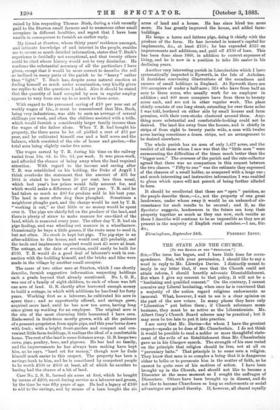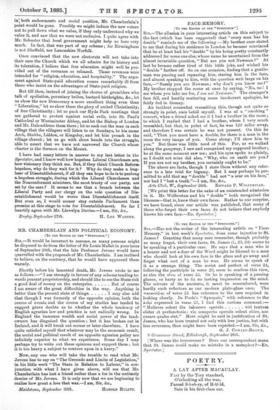THE STATE AND THE CHURCH.
[To um EDITOR OP TIER "SPECTATOR."] Sra,—The term has begun, and I have little time for corre- spondence. Bat, with your permission, I should like to say a word in reply to Mr. Llewelyn Davies. I distinctly meant to imply in my letter that, if sure that the Church could not attain reform, I should heartily advocate Disestablishment. But when I give my consent to that policy, it will not be a "hesitating and qualified consent." On the contrary, I cannot conceive any Liberal hesitating, when once he is convinced that a majority of the nation regard religious endowments as immoral. What, however, I wait to see is a clear opinion on the part of the new voters. In many places they have only "Liberation" put before them ; if Church reformers mean business, they must be as active as the Liberationists. Mr.. Albert Grey's Church Board scheme may he practical ; but it may soon be too late to put it into practice.
I am sorry that Mr. Davies—for whom I have the greatest respect—speaks as he does of Mr. Chamberlain. I do not think it would be possible to read a nobler or more thoughtful state- ment of the evils of an Establishment than Mr. Chamberlain gave us in his Glasgow speech. The strength of his case rested on the principle that religion should be free, not at all on "pecuniary baits." That principle is to some men a religion. They know that man is so complex a being that it is dangerous either to bribe or to persecute him in the matter of faith, as he cannot be quite sure of his motives of action. I have been brought up in the Church, and should not like to become a Dissenter at the same moment as I sought the suffrages of Dissenters. Others have been brought up in dissent, and do not like to become Churchmen so long as endowments or social advantages are gained thereby. If however, all shared equally in, both endowments and social position, Mr. Chamberlain's point would be gone. Possibly we might induce the new voters not to pull down what we value, if they only understood why we value it, and saw that we were not exclusive. I quite agree with Mr. Schuster that local government might help us here very much. In fact, that was part of my scheme; for Birmingham is not Sheffield, nor Lancashire Norfolk.
Once convinced that the new electorate will not take into their care the Church which we all admire for its history and its toleration, I believe that free education might well be pro- vided out of the revenues so released. Those revenues were intended for "religion, education, and hospitality." The argu- ment against State-paid education comes remarkably ill from those who insist on the advantages of State-paid religion.
But till then, instead of joining the chorus of grumblers who talk of spoliation, pecuniary bribes, bastard. birthrights, &c., let us show the new Democracy a more excellent thing even than "Liberation," let us show them the glory of united Christianity, of free Christianity ; let as pack our Hyde Park meetings that are gathered to protest against social evils, into St. Pears Cathedral or Westminster Abbey, and let the Bishop of London and Mr. Dale address them there ; let us seek out the man in each village that the villagers will listen to on Sundays, be his name Arch, Stubbs, Liddon, or Kingsley, and let him preach in the village church ; let us go with clean hands into the struggle, able to assert that we have not narrowed the Church whose charter is the Sermon on the Mount.
I have had many letters in answer to my last letter in the Spectator, and I know well how hopeless Liberal Churchmen are, how visionary they think me. But, if they think Church Reform hopeless, why do they wait for it ? Why do they make a. bug- bear of Disestablishment, if all they can hope to do is to prolong a.hopeless struggle, daring which the Liberal Churchmen and the Nonconformist ministers, the most trusty of our party, are set by the ears ? It seems to me that a breach between the Liberal Party and our clergy on the 'sole question of Dis- establishment would be worse than Disestablishment itself: But even so, I would sooner stay outside Parliament, than promise at this stage to vote for Disestablishment. So far I heartily agree with Mr. Llewelyn Davies.—I am, Sir, Svc.,















































 Previous page
Previous page